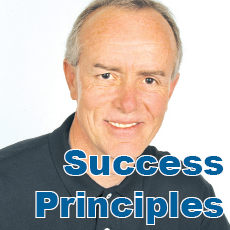Star Trek creator Gene Roddenberry. (Photograph by Larry D. Moore, Creative Commons.)

William “Bud” Hart, of Haverhill, shares “Success Principles”—ideas for living a greater, better and more accomplished life, and building habits that stick. He also coaches clients to incorporate strategies for boosting their mental and physical performance during everyday living.
Do you ever think to yourself if only I can just figure out how to do what I’m really passionate about? Then everything will fall into place and my career and life will be great.
My own life proves that uniting what we are passionate about doing every day with an ideal job and great career simply by thinking about it gets us nowhere. Relying on our minds to analyze and rationalize what our perfect work might be is futile. While just about everyone probably spends some time thinking about their dream job it is not the mind, but rather the heart that holds the answer. And for most people the reason they fail to live the great livelihood they want is because their mind never quits supplying good reasons for not following the path their heart is guiding them to follow.
So here is the question to consider. Is it really possible to do what we love to the point that we can make our living from it? Google this query and you will find all kinds of answers and advice, pro and con. But the only answer that matters is the one found in each one of us individually. And it is up to each and every one of us to figure it out. Here is an inspiring example.
Gene Roddenberry, the writer and Hollywood producer created the 1960’s science fiction television series “Star Trek.” This series has gone on to inspire six feature films and a sequel series starting in the 1980s.
Gene Roddenberry’s story is interesting. As a child he almost died in a house fire along with his mother and siblings, but was saved by a mailman. He became a pilot, flew 89 combat missions in the Army Air Force during World War II and later worked as a commercial pilot for Pan Am Airlines. With Pan Am he survived a terrible plane crash in the Syrian Desert where 14 people died. Although his ribs were broken, he heroically went into the burning plane to save lives. Some credit this incident as the reason Gene Roddenberry quit flying in 1948 and decided to pursue his passion of writing, particularly for television, the new medium of this time.
Although Roddenberry wrote many scripts for television he clearly went against the popularity of cowboys and western television programs at that time when he followed his inner nudges and created the Star Trek series. A show based on space travel was not an easy launch and the path for his dream was anything but straight or smooth. But he believed very strongly in his idea, so when he received constant rejection for his pilot and even when the series was cancelled after three years in production he never gave up. Today the wildly popular Star Trek franchise is still cruising at warp speed, the latest sequel “Star Trek Beyond” was released in July 2016 on the franchise’s 50th anniversary.
What I know about passion is no matter how hard we try, we cannot figure out what to do with what excites us by thinking about it alone. We need to listen to our nudges. We need to feel our way to what we want and are meant to do, from our heart. We need to trust our inner promptings and take action (as Gene Roddenberry did). In a phrase made popular in the Star Trek television series, we need to “boldly go where no man has gone before.”
The quest to live a life we are passionate about is not always easy and we are never guaranteed to be successful in any endeavor we undertake. But building our life around what we love to do is something we are meant to do. And when we do (at least as I see it) it is worth it.
As Gene Roddenberry describes it in his words, “It is the struggle itself that is most important. We must strive to be more than we are. It does not matter that we will not reach our ultimate goal. The effort itself yields its own reward.”
William “Bud” Hart is a certified “Mindset” Coach, Accountability Partner and Business Consultant. Visit Hart Group, www.hartgroupma.com for more on coaching.

